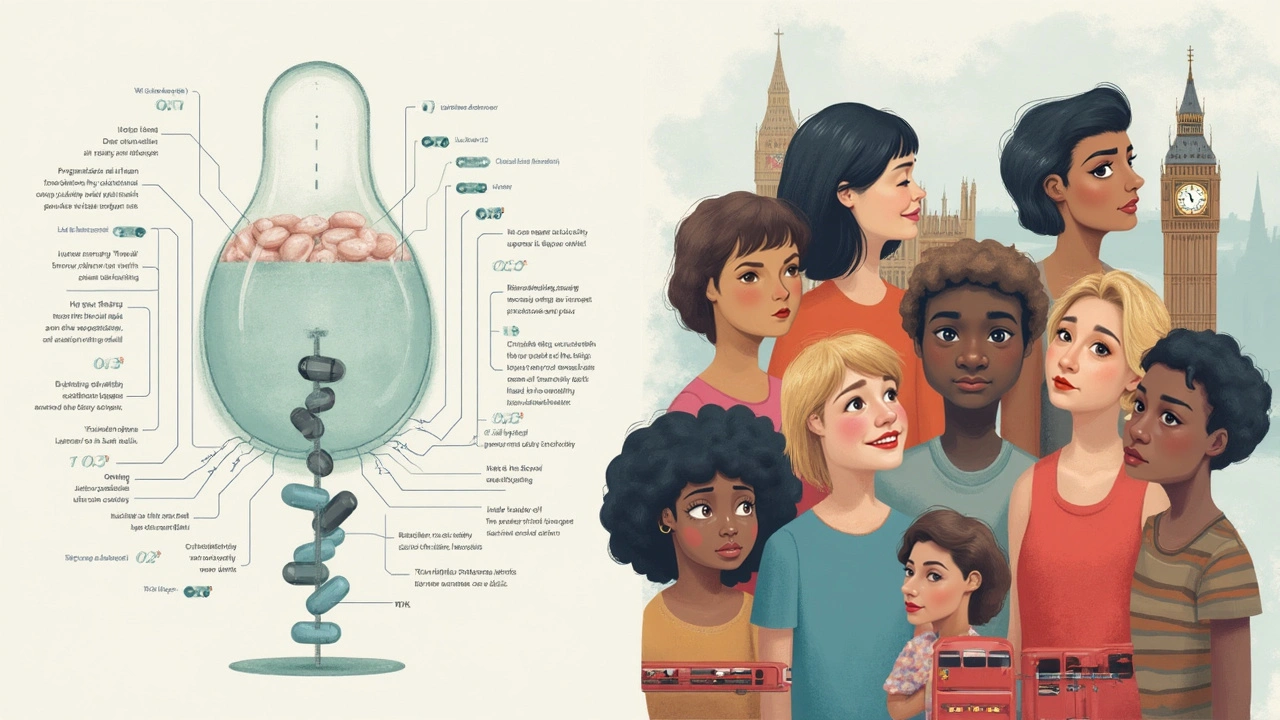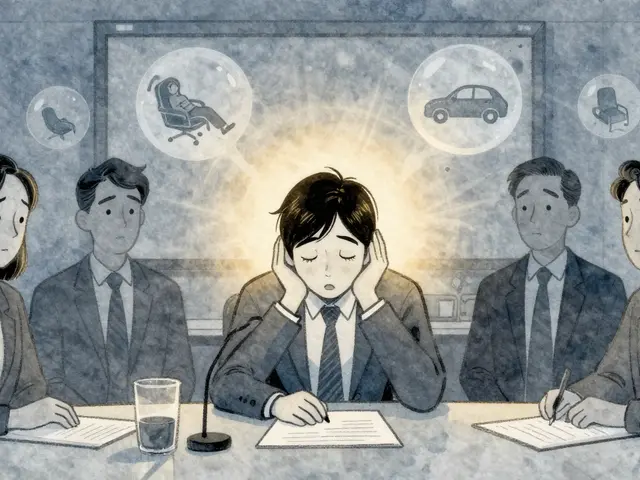Picture this: there’s a tiny white pill that, for millions of people around the world, quietly changes lives every single day. Zoloft, known in the pharmacy world as sertraline, isn’t just another name on a prescription pad—it’s a gamechanger for lots of folks dealing with everything from major depression to crushing anxiety. Even though you’re probably hearing about SSRIs (selective serotonin reuptake inhibitors) on every mental health subreddit and TikTok channel lately, Zoloft really stands out—partly because of how many people use it (in the U.S. alone, over 38 million prescriptions were filled in 2023), but mostly for what it can actually do when used right. But, Zoloft isn't for everyone and it definitely isn’t the magic fix you see in commercials. There’s real science, lots of trial and error, and even some odd side effects to expect. So if you’re wondering what Zoloft’s all about, how it might help you or someone you love, or if you’ll ever ‘feel like yourself’ while taking it, stick with me as we pull apart the facts and track what to expect—warts and wins included.
What Is Zoloft and How Does It Actually Work?
Zoloft, or sertraline, is an SSRI—that’s short for selective serotonin reuptake inhibitor, but don’t let that fancy term throw you off. Think of your brain as a massive city of nerve cells chatting with each other. The main way they pass messages around is with chemicals—serotonin being one of the heavy hitters in the mood department. When someone is depressed or anxious, doctors think the serotonin traffic gets jammed up. Zoloft works by stopping your brain from cleaning up serotonin too quickly. It lets those serotonin messages hang around longer, giving your mood and anxiety levels a better shot at getting back to normal.
Doctors first got the green light to prescribe Zoloft for depression in 1991, but its uses have expanded way beyond that. It’s now approved for social anxiety disorder, panic disorder, premenstrual dysphoric disorder (that’s severe PMS), PTSD, and obsessive-compulsive disorder (OCD). Sometimes, doctors even use it off-label for things like eating disorders or chronic pain. All that is possible because Zoloft is usually well tolerated by people—all ages, from young teens to folks well into their seventies.
Here’s a quick look at some data on how Zoloft is being prescribed in the U.S. from 2019 to 2023:
| Year | Prescriptions (millions) |
|---|---|
| 2019 | 31 |
| 2020 | 35 |
| 2021 | 36 |
| 2022 | 37 |
| 2023 | 38 |
It’s wild to realize just how common it is. That’s probably why Zoloft is one of the top three most prescribed antidepressants worldwide. And it’s not just doctors who are talking about it. In a National Alliance on Mental Illness survey, around 1 in 6 respondents said they’d tried sertraline at least once in their life. Makes you feel a little less alone, right?
But, don’t let the popularity push you to take it without medical advice. Every single person reacts differently, and there's a reason why you need to see your doctor first. If Zoloft worked for your best friend or a TikToker you follow, that doesn’t mean it’ll hit the same way for you. Some folks feel better in a couple of weeks, while others need a full couple of months to see changes. Plus, it can take some patience to find the perfect dose. That said, the general starting dose for depression or anxiety in adults is usually 50 mg per day—but your doc can bump it up if they think you need more help.
If pills aren’t your thing, sorry—Zoloft currently only comes as a tablet or a liquid. No patches, no fun flavors, just the basics. One tip? Take it at the same time every day to make it easier for your body—and your memory. That daily ritual can help people stick with it, which sounds minor but, honestly, half the battle is just remembering to take your meds.

What to Expect: Side Effects, Benefits, and Real-Life Experiences
So what’s it actually like to be on Zoloft? Well, the first thing you should know—things can get weird before they get better. Plenty of people say the first couple of weeks are the roughest. “I felt dizzy and nauseous for about 10 days, and then it just faded out and my anxiety went way down,” said one patient in a University of Michigan study. So yeah, hang tight—the side effects usually show up early and most fade once your body adjusts. The most common ones are nausea, headache, trouble sleeping, and changes in appetite. You might also get dry mouth or feel extra sweaty, especially at night. Here’s a quick list of possible side effects, from data reported by the Mayo Clinic:
- Nausea (up to 25% of new users)
- Insomnia or drowsiness (around 15-20%)
- Digestive issues (like diarrhea or constipation, about 15%)
- Sexual side effects (can include lower libido or trouble reaching orgasm, experienced by up to 30%)
- Headache (roughly 14%)
- Increased sweating (reported by around 12%)
- Weight changes (often mild, but not universal)
But not everything’s a warning label. When Zoloft hits its stride and you’re on the right dose, a lot of people report a slow but steady lift of their mood. Anxiety levels often drop, sleep improves, and for some, the cloud of depression gets thinner. That said, Zoloft doesn’t make you 'happy' in the after-school special kind of way—it nudges your brain back toward its baseline so you can function. Most people don’t feel like a totally different person—they just start finding a bit more motivation, a little less panic, and occasionally, the energy to do regular stuff again. Kind of a reintroduction to your old self.
You have to remember that Zoloft isn’t a ‘forever’ drug for everyone. Some take it for a tough season and gradually stop, working with their health professional. Others use it as long-term support, especially if their symptoms bounce back when they quit. According to a real-world study in 2022, over 60% of people who stuck with sertraline for more than six months were either satisfied or very satisfied with their symptom relief. That’s big, since depression and anxiety are both notorious for creeping back when treatment stops too early.
A great tip: Whenever you start (or stop) taking Zoloft, work closely with your doctor. Stopping cold turkey can give you what’s called 'discontinuation syndrome'—think brain zaps, dizziness, flu-like feeling, or mood swings. For most people, a slow and steady dose reduction, usually over weeks or months, skips most of that drama. And don’t be shy about mentioning even minor side effects—there’s almost always a workaround, whether that’s switching doses, trying a different medication, or adding counseling or therapy.
Now, what about those myths? You’ll hear that antidepressants turn you into a zombie, or that you’ll never laugh, cry, or have a good night again. Honestly, most people don’t lose their personality. But yes, a few report a kind of ‘emotional flattening’. The key is balance. Too flat? Tell your doctor—it’s possible the dose is too high, or maybe Zoloft just isn’t your match.
Here’s what Dr. Mark Goldsmith, a New York psychiatrist, said last year:
“Sertraline [Zoloft] can make a remarkable difference for people whose depression or anxiety is impacting their ability to function day-to-day. What matters most is finding the right treatment—sometimes it’s Zoloft, sometimes it’s another medication, and often it’s therapy too. The most important thing is that you’re not alone in this.”
It’s worth mentioning that Zoloft is one of the few SSRIs approved even for teenagers, with special dosing and monitoring. For teens, parents should watch for any new or worse mood swings, especially in the early weeks. The FDA has a ‘black box’ warning about higher risks of suicidal thinking for young people starting any antidepressant—so regular check-ins, at least weekly for the first month or two, are huge. Even for adults, always call your doctor right away if you notice serious mood changes or thoughts of self-harm.
Studies show that non-drug strategies (like exercise, regular sleep, and therapy) can also add a lot when you’re on Zoloft. Most people do best with a mix—a flexible cocktail that’s tailored for them. Don’t forget: If you drink a lot of alcohol or use other mood-changing drugs, let your doc know. Mixing Zoloft and alcohol tends to make side effects worse and can even tank the depression benefits.
And if you’re curious how long you’ll need help, here’s what doctors typically shoot for: at least six to twelve months after you’re feeling better, then a review to see if you’re ready to try slowly coming off. It’s not about dependence—it’s about giving your brain enough time to really bounce back and reset.

Comparing Zoloft to Other Antidepressants and Tips for Making the Most of Your Treatment
Here’s where things really get interesting—Zoloft has some real cousins out there. Prozac (fluoxetine), Lexapro (escitalopram), and Paxil (paroxetine) are all SSRIs like Zoloft, and doctors often pick between them based on side effects or what worked for your family members before you. But what’s different about Zoloft? For starters, it has a bit better reputation for treating both depression AND certain anxiety disorders. For social anxiety, OCD, and panic disorder, Zoloft is usually a first-choice. Studies out of Johns Hopkins show that people with panic disorder or PTSD tend to tolerate Zoloft a bit better, with lower rates of drowsiness and weight gain than similar meds.
Another angle: Zoloft’s sexual side effects can actually be milder than those seen with paroxetine or Paxil, which is notorious for zapping libido in a big chunk of users. That doesn’t mean it’s perfect, but it has less impact for many people. Worth asking about if that’s a concern for you.
So, how do you maximize your chances of success? Here’s a down-to-earth checklist:
- Never skip your dose—if you miss a tablet, take it as soon as you remember unless it’s almost time for the next one.
- Take your med at the same time every single day—apps and alarms help.
- Don’t chase side effects alone—let your prescribing doc know what’s up, even if it seems minor.
- Add daily movement, even walks around the block boost recovery.
- If your sex life is in a slump, talk about it—options exist!
- Stick with therapy—even a few check-ins can supercharge how well meds work for you.
One super helpful tip: If you know you’re sensitive to meds that upset the stomach, try taking your Zoloft with food. Some people find splitting the dose (half morning, half evening) makes it easier to handle, but check with your prescriber first.
Let’s tackle a common question: what about drinking coffee or tea? Caffeine won’t ruin Zoloft’s action, but too much can worsen the jitters for people just starting out. Moderation is smart. The same goes for herbal supplements—especially St. John’s Wort. Avoid it, since it can mess with how effective your med is, or up your risk for serotonin syndrome—a rare but nasty overdose of too much serotonin. Signs to watch for are shaking, high fever, sweats, and confusion. If that ever happens, get medical help ASAP—it’s rare, but not worth the risk.
And honestly, this journey isn’t about toughness. It’s about giving yourself a shot at feeling more like, well, you. Zoloft isn’t going to solve everything, but for people who need it, it’s like someone finally turned the lights back on after a long, stormy night. “Getting help wasn’t easy, but it saved my life,” said one man from a Yale peer-support group last year. That kind of honesty is just as important as any data or doctor’s note.
Be ready for some trial and error. If Zoloft isn’t the right fit, there are plenty of backup plans—different meds, therapy, social support, maybe all three. Don’t throw in the towel after a rough patch, and definitely don’t go it alone. Mental health care in 2025 is lightyears better than even a decade ago, both in treatments and in busting stigma. There’s no gold star for suffering in silence, but there is a future where you can laugh at old jokes, hit new milestones, and show up for the life you want. That little white pill? Sometimes, it’s the nudge your brain needs to get started.





nalina Rajkumar
Wow this article really covers a lot about Zoloft LOL 😇
I've been curious about how it actually works cuz my friend just started on it and she told me about some side effects but wasn’t sure why they happen 🤔
Glad this breaks it down in an easy way. Especially like how it compares Zoloft to other meds since there are so many antidepressants out there.
Also the personal stories part sounds helpful bc it’s good to know what others experienced 🥰
psychiatrist told my friend it can take several weeks to feel the benefits and this article mentions that too which is nice to hear.
Maybe could add a bit more on what to expect in very early days on the drug? Like how to manage initial side effects or anxiety when starting.
Hope others share their thoughts here too! 😊
Frank Pennetti
Look, while the article covers the basics, it’s really surface level. Anyone who’s done a deep dive on SSRIs knows that the pharmacodynamics are far more intricate than just a simple serotonin boost.
Plus, the comparison to other antidepressants is ridiculously simplified. There’s so much variation in mechanism and efficacy that a casual overview doesn’t cut it.
Also, side effects are glossed over like they’re a minor inconvenience, when in reality they can be debilitating and often underreported.
If you want my two cents, always approach Zoloft and other antidepressants with skepticism and demand more scientific rigor from these summaries.
I’m no fan of bandwagon mental health trends that oversell quick fixes.
Adam Baxter
Hey folks, I think this article is a good starting point.
You don’t have to get lost in jargon to understand that Zoloft acts on the brain’s serotonin system and can help ease depression symptoms.
Sure side effects are a thing but it’s important to remember every medication has some.
Instead of overthinking, just trust the process and give it time—results won’t come overnight.
And if you have doubts, talk to your doc. Simple as that.
What I like is the inclusion of personal stories — makes it way less clinical and more real.
Anyone here tried Zoloft? How’d it go?
Keri Henderson
As someone who supports others through mental health challenges, I appreciate this article's balanced approach.
It’s crucial to acknowledge that while Zoloft can be very effective, it’s not a magic bullet and doesn’t work the same for everyone.
Side effects can be tough, but with proper monitoring and communication with healthcare providers, most can manage them.
My advice: don’t hesitate to ask questions and speak up if symptoms worsen or new issues arise.
This article could help demystify the treatment journey for many.
Stick with it, be patient, and remember you’re not alone.
elvin casimir
What really annoys me is how these articles casually mention taking Zoloft with no real emphasis on the risks or the complex withdrawal symptoms it can cause.
Some people just dump their side effects in a short paragraph, failing to explain the nightmare of coming off SSRIs.
And the spelling errors in medical information can seriously undermine credibility. If you’re writing about something this serious, at least proofread.
The comparison between medications lacks depth and fails to highlight differences in half-life, interactions, and patient suitability.
Anyone going on Zoloft should do tons of research and consult professionals, don’t rely on such superficial summaries.
Steve Batancs
While I agree with a lot of comments stressing caution, it’s important to consider that Zoloft and similar meds remain approved by established regulatory bodies for good reason.
What the article does well is clarify the mechanism and expected timelines — essential info for users navigating uncertainty.
That being said, it could have briefly touched on contraindications and drug-drug interactions to round out safety info.
I’d also like to see more coverage of how Zoloft fits into a broader treatment plan including therapy or lifestyle changes.
In sum, a decent primer but not a comprehensive guide.
Ragha Vema
Honestly I think the whole 'magic pill' narrative around Zoloft is kind of sketchy.
There’s always the lurking question about Big Pharma pushing these meds onto folks without clear info on long-term impacts.
This article tips its hat to side effects but doesn’t dive into dependency concerns or alternative healing options.
From my perspective, mental health care should be more about holistic approaches rather than just popping pills.
Anyone else felt like these drug commercials we see everywhere push solutions that mask symptoms instead of curing root causes?
Just sharing my 2 cents, appreciate a good honest convo here.
Scott Mcquain
In my experience, one cannot afford to be lax when it comes to neuromodulators like sertraline.
Anyone starting Zoloft must adhere strictly to prescribed dosages and maintain regular follow-ups.
Ignoring minor side effects or self-adjusting doses could escalate risks significantly.
This post does a fair job summarizing benefits but definitely underplays the responsibility patients hold.
In addition, the article contains a few grammatical slips that non-native speakers might stumble over.
However, overall, it’s informative and encourages critical thinking about medication use.
kuldeep singh sandhu
I gotta say I’m not fully convinced by articles like this one.
They assume everyone reacts to Zoloft the same way which is simply not true - human biology is far too complex.
What about those who complain of worsening symptoms or no effect at all? The piece doesn’t highlight these enough, just mentions them quickly.
Maybe the mental health industry loves optical simplicity too much.
We should look at more personalized and varied treatment approaches rather than generalizations.
That’s my two cents. Anyone else feel the same?
Mariah Dietzler
Honestly I found the article a bit meh. It covers the basic stuff that you might find on every medical website.
Would’ve been great if it included more recent studies or insider info on Zoloft and its long-term effects.
I’m wary about starting antidepressants so for me, the personal stories section seemed the most relatable but even those felt kind of surface-level.
Wish they’d address more about what to do if Zoloft doesn’t work for you or you get bad side effects.
Anyone with experience switching from Zoloft to something else? How was that?
Jackie Zheng
The article’s thorough explanation of how Zoloft modulates serotonin reuptake is commendable and well-structured.
However, I find the casual tone detracts somewhat from the scientific weight it could carry.
In academic writing, more precise terminology and sentence structure would enhance clarity tremendously.
That said, for public readership, it strikes a balance between accessibility and information.
Adding data from recent randomized control trials would further bolster its credibility.
Would love to see a follow-up that digs deeper into pharmacokinetics and evidence-based outcomes.
Overall good job but room for refinement.